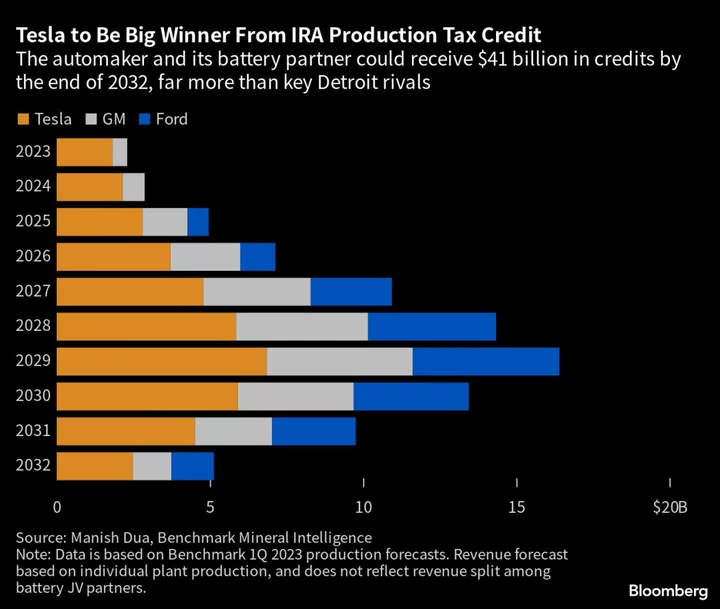Since the Inflation Reduction Act was signed into law one year ago this week, there’s been $59 billion in new EV investments announced in the US, according to BloombergNEF.
It’s hard to parse how much of that might have happened anyway — automakers were pouring money into new EV plants before the law passed — but it is clear that the IRA’s massive outlay of subsidies and tax credits is attracting investment. Look at Tesla Inc.’s expansion plans in Nevada, or Stellantis NV’s threat to move its under-construction battery plant from Canada to the US.
Still, big hurdles remain for the much-hyped law to fully make good on its goals. If the endgame is speeding EV adoption while creating well-paying clean energy jobs, we also need to look beyond investment dollars and high-profile EV unveilings to measure the law’s efficacy. A year isn’t enough time to see all these outcomes, so here are four things to watch:
United Auto Workers Negotiations
Shawn Fain, who won the first direct election in the UAW’s 88-year history this spring, is upfront about his dissatisfaction with the IRA. Fain has criticized the Biden administration for giving billions in taxpayer dollars to companies that want to pay battery workers less than what union members make in a traditional vehicle-assembly plant.
There’s one UAW-organized battery plant in the US so far — General Motors Co.’s Ultium joint venture with LG Energy Solution in Ohio — but the employees don’t have a contract yet. GM and its partner argue these workers shouldn’t be part of the master contract negotiated by the UAW, because the joint venture is a separate entity. That question, more than any other issue, will shape what kind of wages and benefits these new EV jobs offer.
The UAW’s four-year contract with GM, Ford Motor Co. and Stellantis expires Sept. 14. The union is asking for a 46% wage increase, restoration of traditional pensions, cost-of-living increases, a 32-hour work week and increased retiree benefits — demands that could add more than $80 billion to each of the biggest US automakers’ labor costs.
Fain has been rallying members for a potential strike if he doesn’t like the offers on the table. The outcome will set the bar not just for unionized workers, but non-union plants that track Detroit standards to compete for labor.
Political Risk
One person happy to exploit any daylight between the UAW and Biden is Donald Trump, who has been attacking the current president’s electrification agenda on the campaign trail. Trump says EVs will “decimate” American auto jobs.
The former president is tapping into very real anxieties: EVs will require fewer workers to build, a reality that is top of mind for UAW members. Nor does anyone know how quickly this transition will happen in the US. Traditional automakers and upstarts like the electric bus maker Proterra, which just declared bankruptcy, are still trying to reach the scale needed for EVs to be affordable for consumers and profitable for companies.
House Republicans already tried to defund the IRA this year; they and several economists have warned that the law’s true price tag could be triple the $386 billion the Congressional Budget Office estimated. The concentration of EV and battery plants in red states may seem like a safeguard against any rollback, but Trump-affiliated think tanks are churning out proposals to dismantle Biden’s EV push.
Defunding the IRA could take a carrot away from price-sensitive car buyers and make it harder for automakers to turn a profit on EVs, prolonging their reliance on gas-guzzlers.
Electric Vehicle Demand
The auto industry has sent mixed signals on EV demand lately. Plug-in sales in the US grew 50% in the first half of this year, down from a growth rate of 65% last year and 71% in the first half of 2021, according to Motor Intelligence.
It’s normal for growth to be faster when you’re starting from a small number. More startling was the swelling inventory of EVs sitting on dealer lots in June, which has sparked concern that the industry may be running out of the early adopters it relied upon for initial demand.
To boost sales against a backdrop of inflation and greater competition, Tesla has said it will use its IRA production tax credits to keep slashing prices for consumers. That crusade is putting pressure on auto incumbents to follow suit, adding to profitability challenges as they electrify their lineups.
Ford slashed prices on its F-150 Lightning electric pickup by as much as 17% this summer, and is adding more hybrid options to remain “nimble,’’ Chief Executive Officer Jim Farley told investors last month. While the automaker still believes EV sales growth will continue, Farley expects the EV market to “remain volatile until the winners and losers shake out.”
Private Investor Buy-In
Vehicle and battery plant investments are booming in the US. But the most difficult challenge is building pieces further down the EV supply chain, like processing plants that turn metals such as nickel and lithium into ready-to-use battery powder. These operations are still dominated by China and don’t really exist in the US yet. The Department of Energy is pledging record amounts of money to change that, but it needs private capital to step up and match its efforts.
There are pools of private equity waiting to be deployed into climate investments, but a lot of that money requires firm contracts and operational maturity that many of these companies don’t yet have. High interest rates and bureaucratic red tape on mining permits aren’t helping.
Jigar Shah, who oversees the DOE’s efforts as director of its Loan Program Office, often talks about building the “bridge to bankability” for companies too young and risky for private investors. Even with an unprecedented push by the Biden administration, the chicken-and-egg problem still lingers. Watch out for breakthrough deals that show whether this bridge can be crossed.

